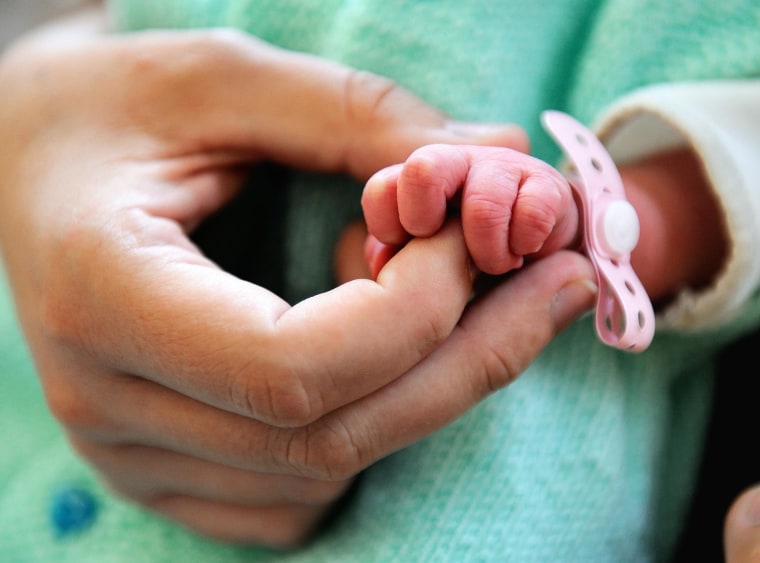Researchers looking for simple ways to treat autism say they may have explained why at least some cases occur: It all has to do with the stress babies undergo at birth.
They’re already testing a simple drug for treating kids with autism and say their findings may point to ways to treat the disorder earlier in life.
It’s all experimental, but the study, published in the journal Science, should inspire other researchers to take a closer look. “This is exciting stuff to people in the field, because it’s getting at a basic mechanism," says Andrew Zimmerman of the University of Massachusetts Medical School, who reviewed the study.
Yehezkel Ben-Ari of the Mediterranean Institute of Neurobiology in Marseille, France, and colleagues have been treating children with autism with a diuretic called bumetanide that reduces levels of chloride in cells. Diuretics lower blood pressure by making people urinate more, reducing fluid.
Ben-Ari has had mixed success in his trials in kids, and wanted to prove his theory that chloride was the key.
He worked with two rodent “models” of autism — they’re the closest things scientists have for replicating autism in a human. One has mutated genes linked with autism, and another develops autism when given valproate, an epilepsy drug blamed for causing autism in the children of mothers who take it while pregnant.
“We have shown that if we administer the diuretic to the mother for 24 hours before and during delivery, the offspring is … cured."
They looked at what was going on in the brains of the mouse and rat pups just before and after birth. Then they gave the mouse and rat moms bumetanide — and fewer of their newborns showed autistic-like behaviors.
It suggests that a reset button isn't working in the brains of newborns as they are delivered.
“We have proven the concept that in autism, indeed chloride is elevated and perhaps our diuretic acts in reducing that,” Ben-Ari told reporters on a conference call. “We have shown that if we administer the diuretic to the mother for 24 hours before and during delivery, the offspring is … cured."
Ben-Ari has founded a company that is looking to develop a drug that might be used to treat autism.
No one suggests giving any such drug to a pregnant woman and especially not to a newborn. Its safety would have to be tested. Plus, right now there’s no way of telling whether a pregnant woman’s unborn baby is going to develop autism. “It’s impossible in humans — that’s the problem,” Zimmerman says.
Autism is becoming more and more common among U.S. kids, and researchers don’t quite understand why. The latest survey by the Centers for Disease Control and Prevention shows 2 percent of U.S. children have been diagnosed with an autism spectrum disorder, which refers to a broad range of symptoms, from the relatively mild social awkwardness of Asperger’s syndrome to profound mental retardation, debilitating repetitive behaviors and an inability to communicate.
Genetics are a large factor — if one twin has autism the other twin is very likely to — but genes don’t explain it all. Better diagnosis doesn’t explain all of it, either, and many scientists are looking at what happens in pregnancy. Some studies suggest that infections such as influenza during pregnancy may play a role.
"It’s impossible in humans — that’s the problem.”
There’s no cure and no good treatment.
Zimmerman says the brain is overexcited in autism, and Ben-Ari says his study shows that chloride is responsible for at least some of this. The process of giving birth can re-set the over-excited neurons, and the new study in Science suggests that oxytocin, the so-called "love hormone" which is released during birth, may play a role in doing so.
The diuretic has similar effects, Ben-Ari says. He is currently treating kids aged 3 to 11 with it but thinks if autism could be diagnosed younger, and kids treated younger, it might be more useful.
“The possibility for perinatal treatment with an agent such as bumetanide is an enticing possibility for the prevention or early treatment of the disorder,” Ben-Ari’s team wrote in their report. “However, this would require an accurate way to determine whom to treat because symptoms of autism spectrum disorder often do not appear until the second year of life.”
The study suggests a way to do this, Zimmerman says. The blood and amniotic fluid of pregnant women could be tested for chloride levels, and the newborns followed to see if those that develop autism wee exposed to more chloride in the womb.
